6,627 candidates will participate in early parliamentary elections in Ukraine, including 312 current MPs (mostly form the Bloc of Petro Poroshenko, the Batkivshchyna, and the AUU Svoboda). Most of candidates, both included in party lists and nominated in single-member districts, graduated higher education institutions (92%). It's interesting that 98% of candidates included in the list of the Opposition Bloc party are unaffiliated candidates. However, 100% of nominees from the AUU Svoboda and 99% from the Communist Party are affiliated to political parties. Women are underrepresented in single-member districts (only 12.9%). On the other hand, they dominate or are well-represented in lists of some parties ("Solidarity of Women of Ukraine" party – 74%, the Syla Liudei party – 43%, the National Democratic Party of Ukraine – 36%). As for the positive tendencies of the current campaign with regards to parties' lists candidates, the number of women has increased (25.8 %) and the number of young candidates under 35 years old is rather high (32 %).
September 30 was the last day for registration of MP candidates. As of 1 October, the Central Election Commission (CEC) has registered 6,627 MP candidates; 3,121 of them nominated by the party lists and 3,506 in single-mandate districts. In total, 29 political parties nominated their candidates in multi-mandate national district, that is 8 parties more than in 2012 parliamentary elections. In comparison with the last regular elections to the Parliament, the number of political parties that nominated their candidates in single-member districts has decreased by 2,5 times (32 now and 81 in 2012).
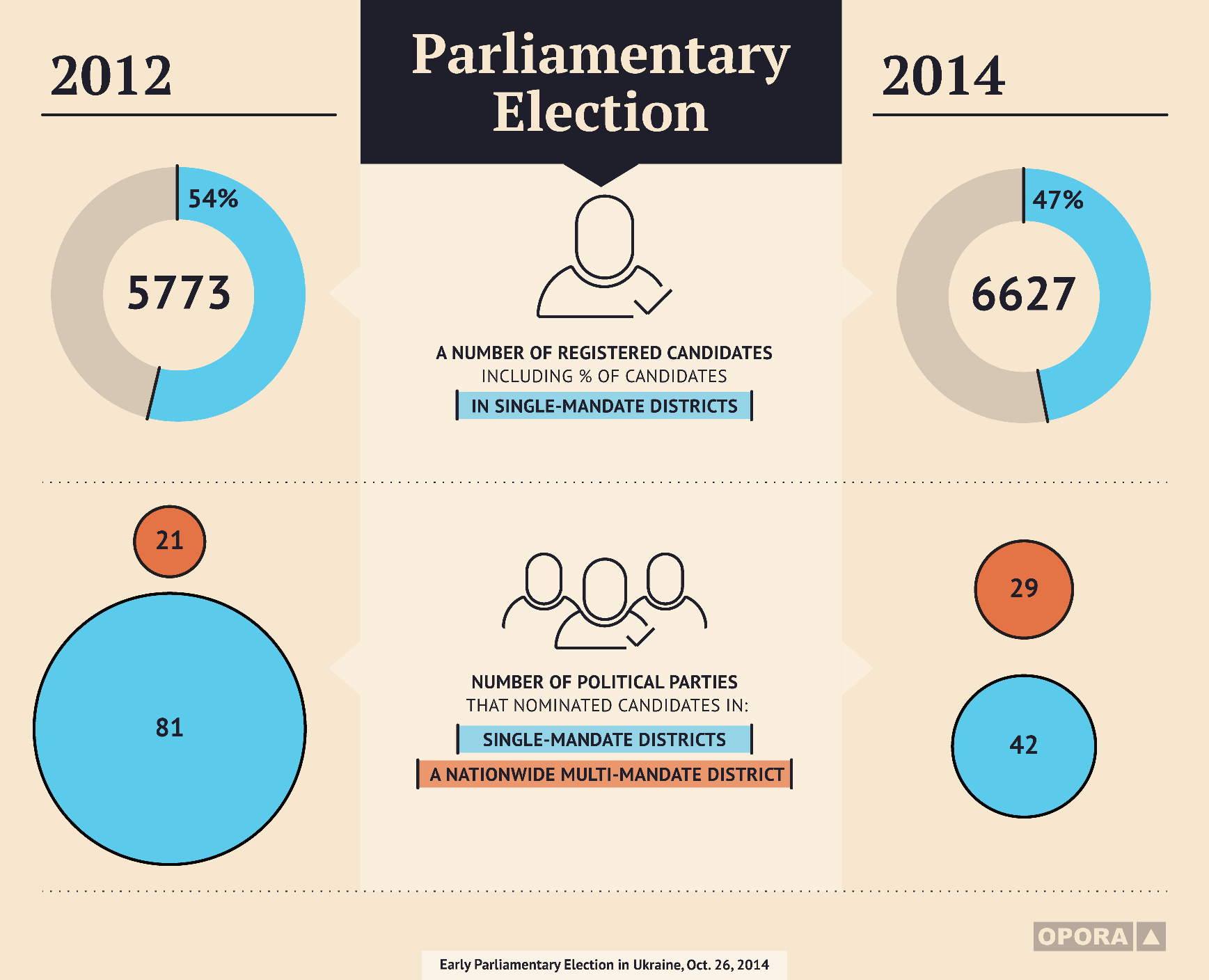
Despite the broad public discussion on lustration and "full renewal" of the newly-elected parliament, 312 of 450 MPs of the Verkhovna Rada of VII convocation participate in these elections. Having reserved places in party lists, one third of current MPs (153 persons, 4.89% of the total party list candidates) will try to get into the Parliament again. 9 parties have nominated current MPs. Party lists of the Bloc of Petro Poroshenko contain the largest number of current MPs (42), then goes the All-Ukrainian Union "Batkivshchyna" (26), and the All-Ukrainian Union "Svoboda" (23). Another one third of current MPs (159 persons, 4.58 % of majoritarian candidates) run in single-member districts; 109 as self-nominated candidates and 50 candidates nominated by parties.
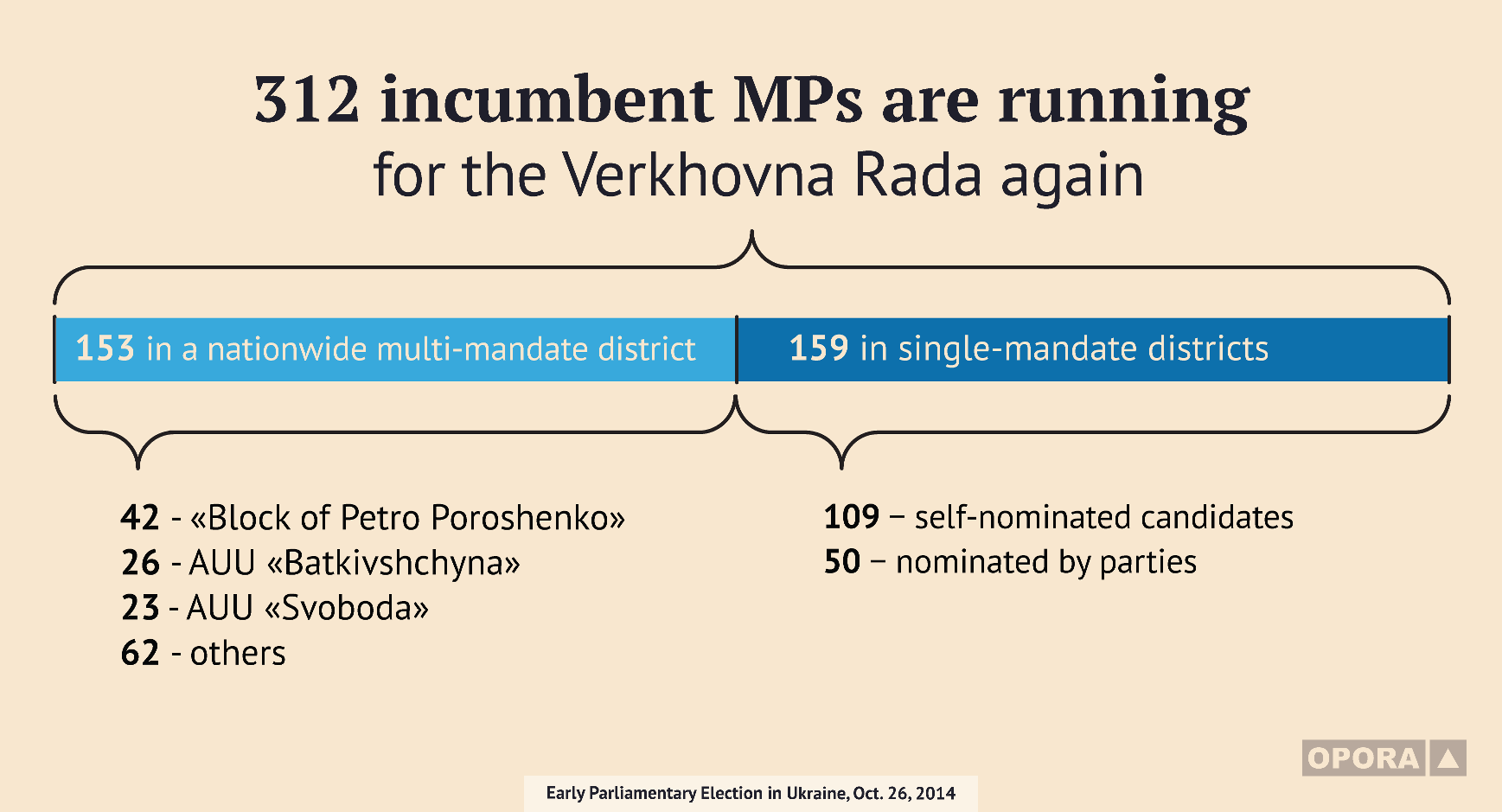
According to OPORA's analysis, most of candidates in both nationwide and single-member districts are of middle age 36-59 years, 57% and 66% respectively. It's typical that there are three times less pension age candidates (60 years and more) than candidates of the "youth" category (35 years or less), 11% and 7% in nationwide and single-member districts respectively. This year, almost one third of MP candidates are under 35 years: 32% in nationwide district and 27% in single-member districts.
It's an interesting fact that only 15% of party list candidates and 14% of candidates in single-member districts are temporarily unemployed. According to the collected data, rounded percentage show: 92% of candidates graduated from heigher education institutions (HEIs); 4.69% – obtained secondary education; 3.18% – technical or special secondary education; 1% – unfinished or basic higher education. Only three parties have included in their lists more than 10 candidates with secondary education: the All-Ukrainian Union "Svoboda" (26 persons); the Political Party 5.10 (25 persons); and the Radical Party of Oleh Liashko (17 persons).
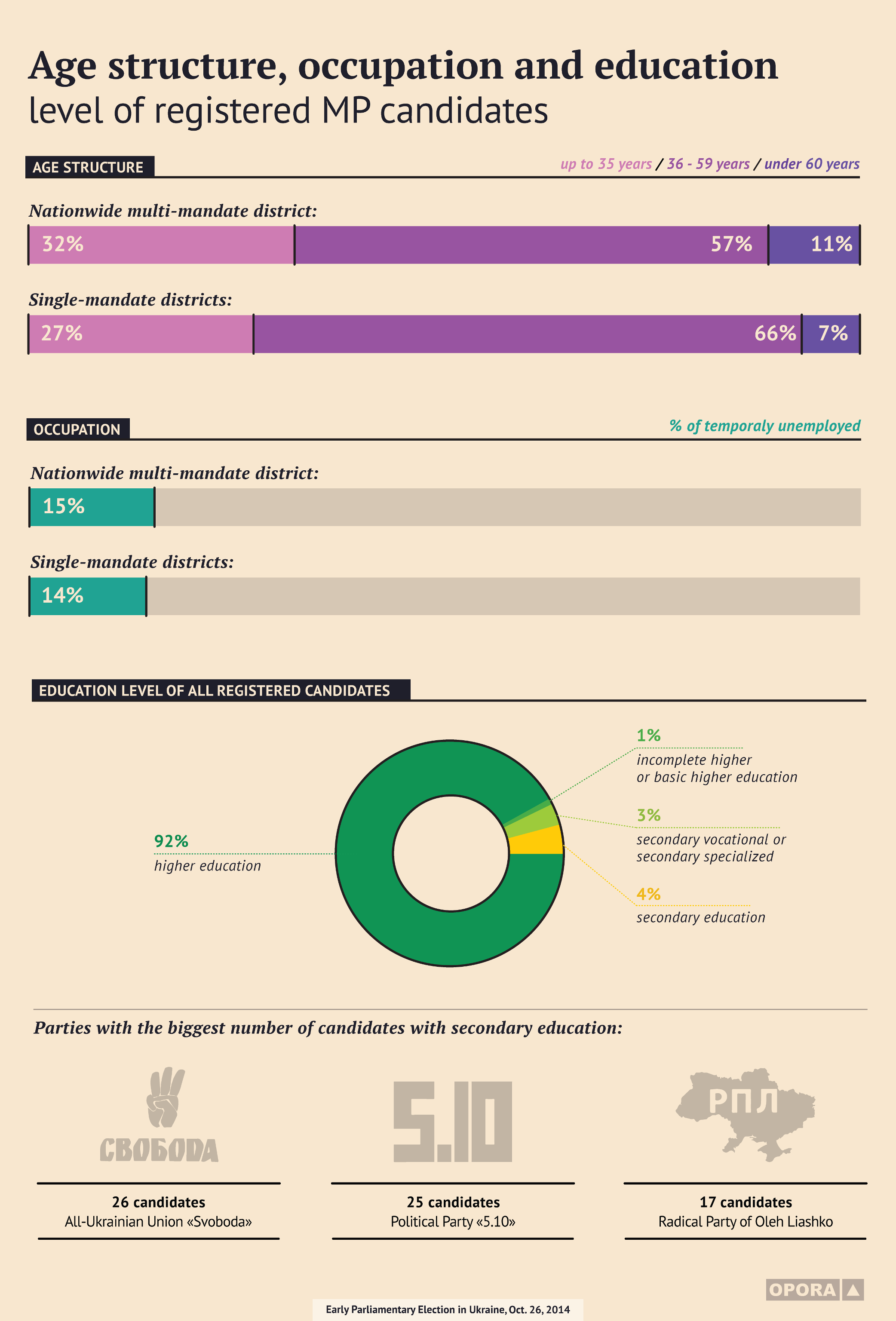
Almost every elections in Ukraine have a similar issue of of gender quotas in party lists, and low participation of women in the election process. According to the Article 8(10) of the Law of Ukraine on Political Parties in Ukraine, every party should determine quotas for minimal representation of women and men in the nationwide party lists for parliamentary elections in its statute, and such representation should be 30% or more. However, only 10 of 29 registered political parties that nominated candidates in party lists in the nationwide single-mandate district have included 30 and more percent of women in their party lists, in accordance with Ukrainian legislation. Another 5 parties have 25-29.9% of women in their party lists. In total, 25.78% of the total number of candidates nominated by party lists are women. Such percentage is slightly higher than during the previous parliamentary elections. Around 24% of women were nominated by party lists in 2002 parliamentary elections; 17.8 % in 2007, and 19.78 % in 2012. Besides that, only 2 parties nominated more than 30% of women by party lists in 2012.
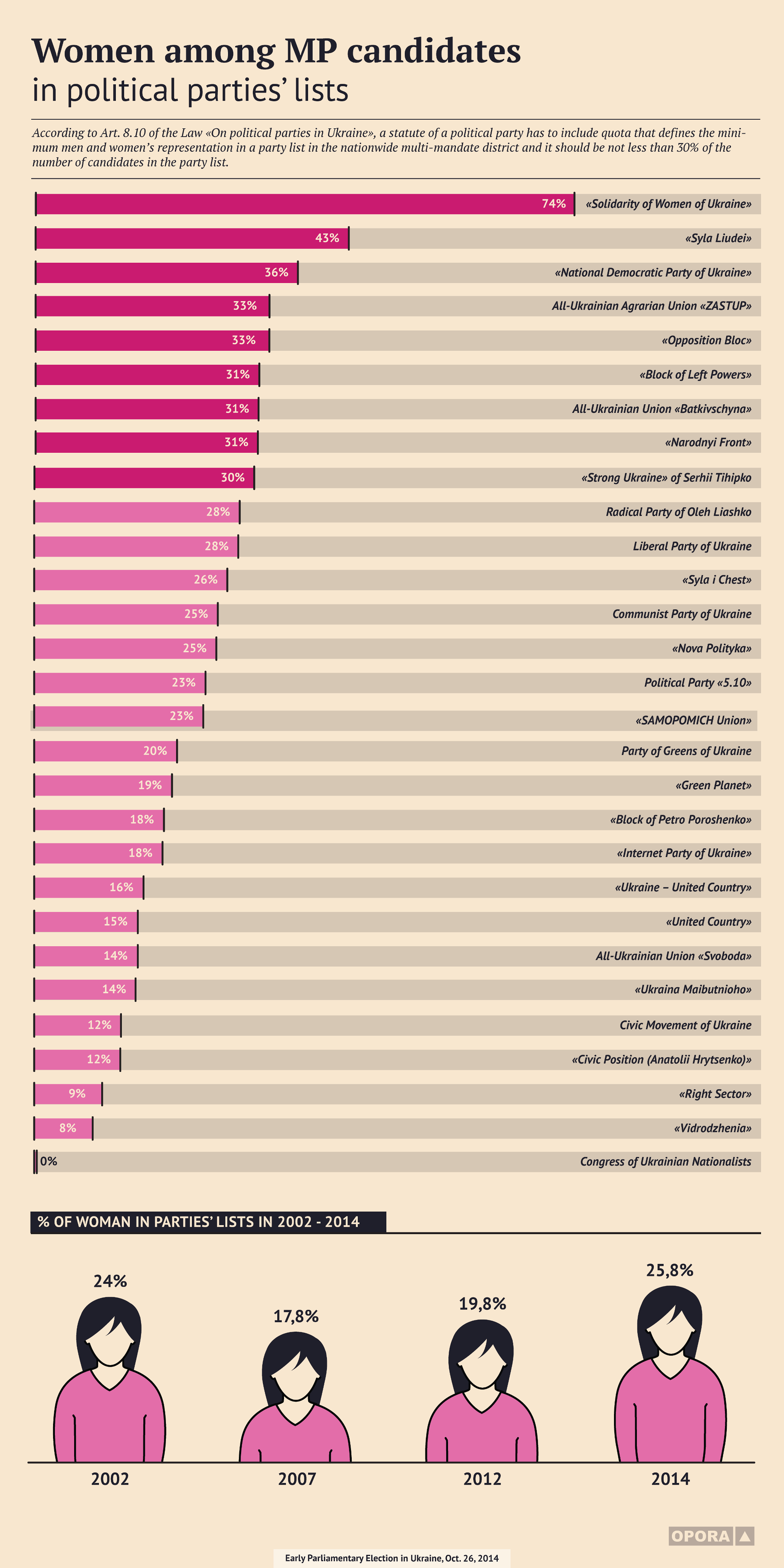
Traditionally for the elections in Ukraine, political parties include a lot of unaffiliated candidates in their party lists. Thus, nearly 40% of unaffiliated candidates run in the nationwide districts this year. Such high percentage can be explained by the fact that current legislation doesn't provide creation of party blocs. However, several parties decided to consolidate their efforts due to the political situation, or have united specially for the elections. Therefore, many candidates in such united party lists have leaved their parties, which were not registered as electoral subjects. We should mention that 11 parties have 50 and more percent of unaffiliated candidates, and 3 of these parties have more than 90% of unaffiliated candidates (the Opposition Bloc (98%), the "Ukraine - United Country" (96%), the "Green Planet" party (91%). Only two parties don't have any unaffiliated candidates in their party lists – the All-Ukrainian Union "Svoboda" and the National Democratic Party of Ukraine. Party list of the Communist Party of Ukraine contains only two unaffiliated candidates (1%).
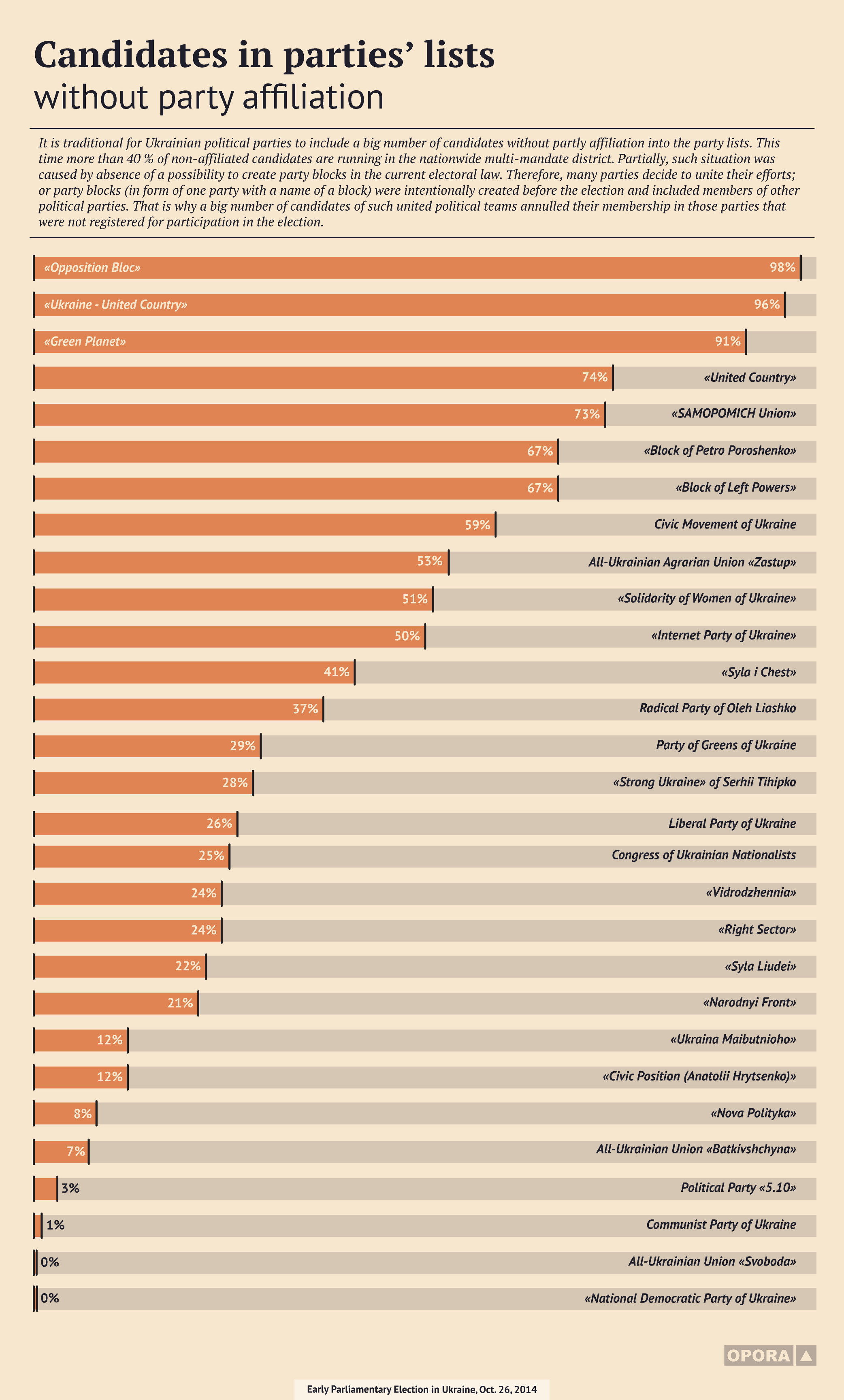
From the start of nomination of MPs candidates to the end or registration period, the Central Election Commission (CEC) had published 214 resolutions in which it refused to register 819 candidates. Most of resolutions of refusals were passed on the basis of more than one reasons. In most instances, candidates received refusals due to the absence of obligation to stop activities, incompatible with the mandate of MP of Ukraine, in case candidate is elected (389 instances), 47 resolutions – the absence of all the necessary biographical information; 39 resolutions – incomplete application for registration.
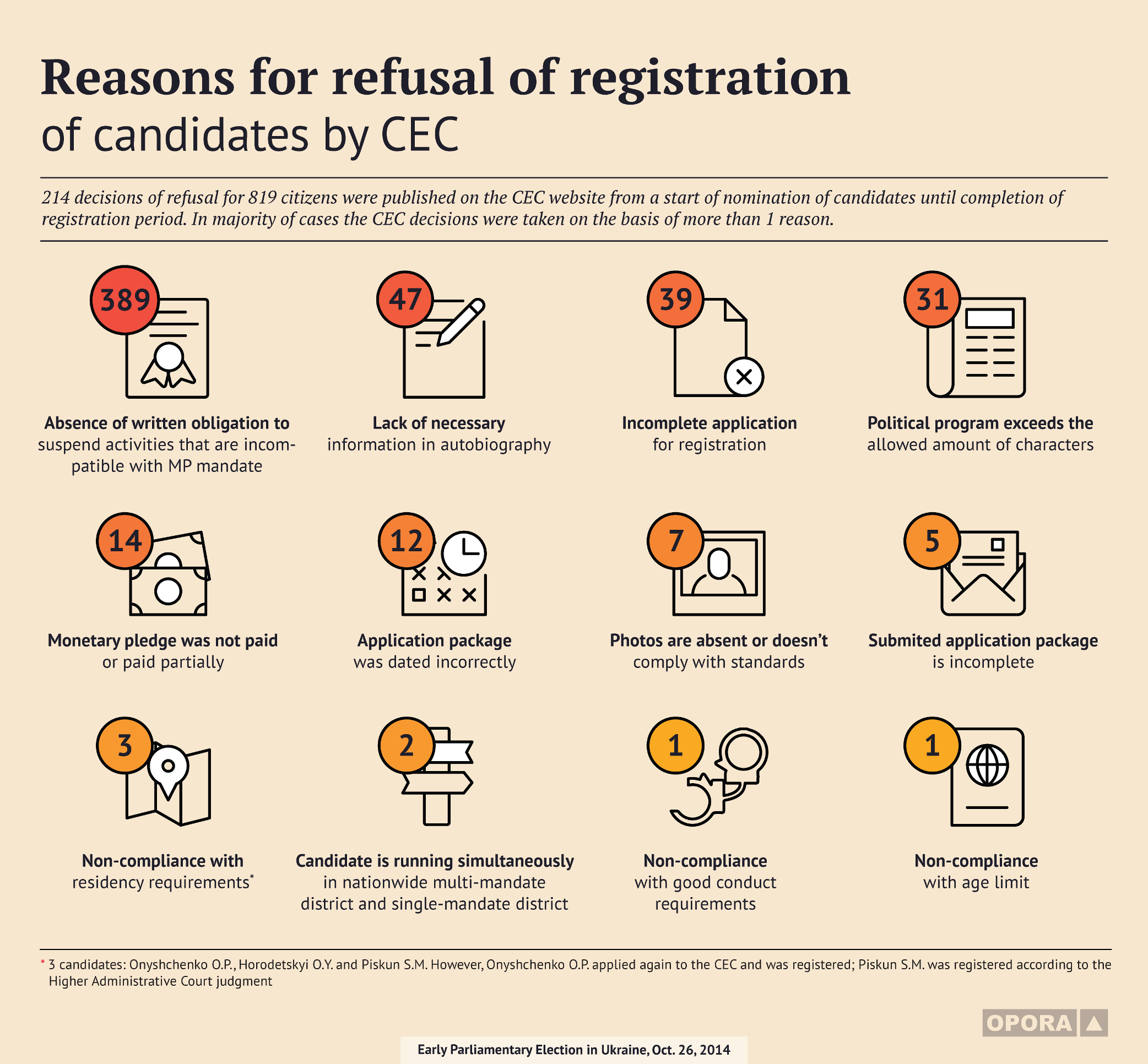
Source: website of the CEC (as of October 1, 2014); Civil Network OPORA
You are welcome to see the Full Interim Report on the Results of September Observation conducted by Civil Network OPORA during Parliamentary Elections to be held on 26 October 2014: here.